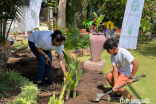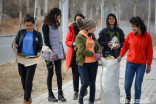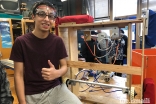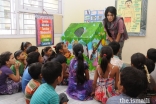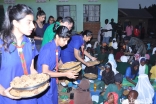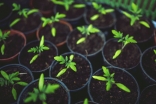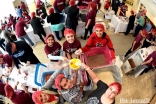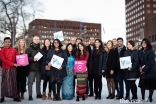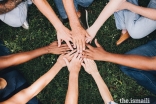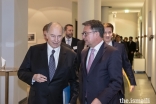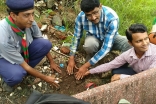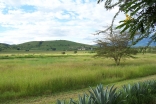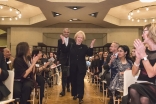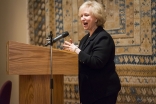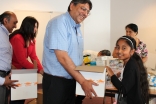Content Tagged with Civil Society
This weekend in cities across the globe, a unique collaborative event is set to unfold. More than 58,000 people will come together to mark the third annual Global Ismaili CIVIC Day, in a display of kindness, generosity, and good citizenship.
On 25 September, the worldwide Ismaili community will unite in a concerted effort to improve the quality of life in our neighbourhoods and societies through Environmental Stewardship.
“I volunteer because it is a chance to be part of something bigger than myself,” says Roza Amanbekova, a senior Communications and Media student from the University of Central Asia (UCA). “It is discovering the world and making it better.”
Thousands of members of the Jamat are busy making final preparations ahead of the inaugural Global Ismaili CIVIC Day, to be held this weekend in more than 30 countries around the world.
Everything is made of something. Materials science is the study of what objects are made of – from metals to ceramics and polymers – and why certain materials function the way they do. It is the science that explains why your phone charger is made of the insulator polycarbonate or why a car contains the fireproof material fiberglass in its bumpers, doors, roof, and wheels. Though materials science and engineering (MSE) is not often studied in schools, it is the foundation of all objects in our world.
Civil Society has the potential to play a fundamental role in bringing about change for a brighter future. This article features stories of individuals who have brought about change and bettered the lives of others, illustrating that each of us, in our own special way, can can help one another to build a better future.
In Islamic belief, caring for the poor and the needy is a long established tradition. Serving orphaned children is especially commended, as quoted in the Qur’an and sayings of the Prophet (peace be upon him and his family). With this in mind, young members of the Ismaili Volunteers Corps and the Aga Khan Scouts and Guides in Uganda gathered in June to serve hearty meals to orphaned children at the Kasanagati Orphan Fans Society in Kawanda.
Younger generations invariably inherit the earth from those who came before. It is often these youngsters who are leading action to create positive change in their surroundings. Here are some examples of inspiring stories of young members of the Jamat working to introduce sustainable and environmentally friendly practices in their communities.
As long ago as 1835, French historian Alexis de Tocqueville visited the United States and recognized a unique characteristic, namely, the role played by voluntary private associations in social, political, and economic life. He suggested this freedom to associate was the “mother science” which illustrated how other societal problems might be resolved. Today, the United States Jamat is continuing a long tradition of volunteering for the public good.
Over the years, Mawlana Hazar Imam has often spoken of the importance of civil society and of contributing towards the wellbeing of our communities. The iCERV programme in the UK has demonstrated that this ethic is very much alive within our Jamat.
Over the years, Mawlana Hazar Imam has often spoken of the importance of civil society and of contributing towards the wellbeing of our communities. The iCERV programme in the UK has demonstrated that this ethic is very much alive within our Jamat.
Motivated, young Ismailis from across the globe are involved in civil society initiatives that serve their communities and societies, often started by themselves, and are gaining recognition at national and international levels.
The.Ismaili is pleased to publish an interview with Dr Amyn Sajoo, a specialist in international human rights, civil society, and public ethics. As part of a series of interviews with key figures, Dr Sajoo discusses the notion of civil society, its history, significance, and potential to enrich democratic life around the world.
The term civil society often appears in conversations amongst people concerned with social progress and positive change. But what does it actually mean, and why is it important? Here we explore some key aspects, and consider how the ethics and values of the Ismaili community can inspire us to contribute towards a strong civil society.
Mawlana Hazar Imam spoke at a conference in Berlin, Germany on 15 January 2019, during an event focussed on stability and effective development in fragile environments.
Across India this 15 August, Ismailis celebrated their nation’s independence through acts that contributed to the wellbeing of society. Members of the Jamat planted trees, cleaned up local monuments and put on street plays to educate about traffic safety.
With a major expansion underway, the Aga Khan University is planting institutional and intellectual seeds to produce the leadership that East Africa will require in the years ahead. Dr Farouk Topan discusses some of the ways in which the university hopes to contribute to the East African Community.
In November 2014, the Right Honourable Kim Campbell, Canada’s 19th Prime Minister, delivered a lecture at the Ismaili Centre, Burnaby on the topic of Building Civil Societies: The Role of Women Leaders. Ms Campbell is the first woman to have become Prime Minister of Canada as well as the country’s first female Defense Minister and Minister of Justice.
Former Canadian Prime Minister Kim Campbell — Canada’s first female prime minister — delivered an Ismaili Centre lecture in Vancouver in November. She spoke passionately of the need for more women in positions of leadership at all levels of society and the importance of ensuring their voices are heard.
London, 7 July 2014 – Over 5 000 parcels of food and provisions were packed at UK Jamatkhanas this Saturday to help some of the most vulnerable populations in London, Birmingham and Leicester. Local charities will distribute the packages under Share a Smile, an Ismaili community initiative to help those in need during the month of Ramadan.


